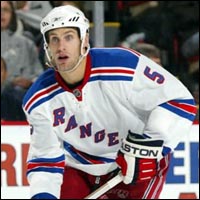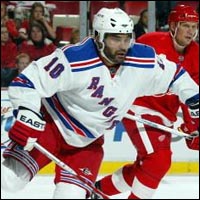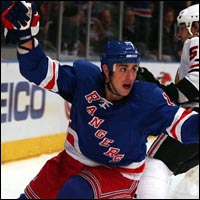by Bob Crawford || AHL On The Beat Archive
 |
| Dan Girardi was an AHL All-Rookie selection in 2006. (Photo: Claus Andersen/Getty Images) |
In the first few years of the Hartford Wolf Pack’s history, there was not much of a development pipeline between the Pack and the parent New York Rangers.
The Wolf Pack boasted excellent teams at the AHL level, and a number of players on those early Wolf Pack clubs went on to have some solid success in the NHL with other organizations, but the instances of young players cutting their teeth in Hartford and then moving on to productive roles in New York were few and far between.
Since the 2004-05 NHL lockout, however, the Wolf Pack club has become a much more fertile developing ground for important Ranger talent, and several of the big club’s more dependable and versatile performers are guys who have come up to the Rangers from the Pack.
It all started at the NHL trading deadline in March of 2004, when the Rangers made a philosophical decision to enhance their emphasis on player development. They made a host of deals that year leading up to the deadline, almost all of them geared around clearing space on the roster and stockpiling young players and draft picks.
Heading into the 2004 NHL Entry Draft, the Blueshirts owned 13 picks in the draft’s nine rounds, and the players selected with those choices would form a wave of depth that would make the Wolf Pack a much younger team, and populate the organization with a host of fresh legs to push the more established players on the NHL roster.
Then, coming out of the lockout, a couple of young players made the jump to the 2005-06 Rangers from the Wolf Pack, to start giving the big club somewhat of a new look.
The most successful was Fedor Tyutin, who had played most of the 2003-04 campaign in Hartford and started the lockout year with the Pack, before heading back to finish the season in his native Russia. Tyutin, a second-round pick by the Rangers in 2001, made the Rangers out of training camp in 2005 and never looked back, dressing for 77 of the big club’s 82 games that year and notching six goals and 19 assists for 25 points. Those totals tied Tyutin for the Rangers’ goal-scoring lead among defensemen, and were good for second among team rearguards in points.
After a somewhat off year in 2006-07, Tyutin rebounded to log another solid season with the Blueshirts last year. The Russian import played in all 82 games in 2007-08 and netted five goals and added 15 assists for 20 points, while going +5 for the season. That plus/minus rating was good for second among Ranger D-men, and Tyutin ranked third among team defensemen in points and goals.
That, as it turns out, was his swan song as a Ranger, as Tyutin was traded to Columbus in July, along with fellow blueliner Christian Backman. In return, though, the parent club received two other young assets, forwards Nikolai Zherdev and Dan Fritsche.
 |
| Nigel Dawes scored 35 goals as an AHL rookie in 2005-06. (Photo: Claus Andersen/Getty Images) |
Also graduating from the Wolf Pack to the Rangers in 2005-06 were forwards Dominic Moore and Ryan Hollweg, who played less prominently-featured roles than Tyutin did, but still were important parts of the fabric of the first Ranger team to make the NHL postseason since 1996-97.
Moore averaged just under 12-and-a-half minutes of ice time in playing all the season’s 82 games, and contributed nine goals, eighteen points and a +4. Like Tyutin, he too would be traded for a fellow young player, in Moore’s case to Nashville for Adam Hall in July of 2006.
Hollweg, meanwhile, was able to find a niche for himself as the Rangers’ “designated hitter”, a guy who would usually play three or so shifts per period and generate energy by throwing his 5-11, 210-pound frame around with reckless abandon. Although at times throughout his three years and 200 games with the Rangers he became too reckless, there is no doubt that his aggressiveness on the forecheck and penchant for taking the body at every opportunity was an important ingredient for a Ranger club that certainly had more than enough finesse.
The next year, 2006-07, was another good one for bringing players along through the Ranger system, particularly in the second half of the season.
First, defenseman Dan Girardi was summoned from the Wolf Pack to the Rangers January 25th, just before he was slated to help represent the Pack at the 2007 AHL All-Star Classic in Toronto. Girardi would quickly establish himself as a full-time NHLer, and that would represent a real scouting coup by the Rangers.
Despite an extremely solid Ontario Hockey League Junior career that included a Memorial Cup championship, another trip to the Memorial Cup Finals and a further OHL Finals appearance, and good size at 6-2 and 200 pounds, Girardi had gone unselected throughout his years of NHL Draft eligibility and had come to the 2005 Ranger training camp on a tryout. After a good showing at that camp, he earned an AHL contract, but had to start his first pro year in the ECHL with Charlotte.
That the Ranger talent bird dogs had unearthed a diamond in the rough became apparent when, after being recalled to the Wolf Pack in November, Girardi played well enough on the Hartford blueline to earn AHL All-Rookie honors for 2005-06. The Rangers wisely signed him to an NHL deal in the summer of 2006, and upon giving him that late-January shot at the Big Show, found themselves with a dependable NHL backliner on their hands. Girardi logged nearly 16 minutes per game of ice time in the 34 games he played for the rest of 2006-07 and was +7, third-best on the Blueshirt defense.
Girardi showed that snapshot was no fluke last year, when he was in uniform for a full 82-game schedule and trailed only Michal Rozsival on the Ranger blueline in points (28), goals (10), assists (18) and ice time (21:11 per game). No better argument can be made for the value of player development than that contribution.
Following Girardi to Gotham in the second half of 2006-07 were goaltender Steve Valiquette and Girardi’s fellow OHL product and 2007 AHL All-Star Classic invitee, and Wolf Pack roommate, Ryan Callahan.
Valiquette had enjoyed more than one “cup of coffee” in the NHL in the previous eight years of his pro career, but had never stuck at the NHL level prior to taking over as the Ranger backup goalie from Kevin Weekes in February of 2007. And Callahan, while not as thoroughly overlooked as Girardi had been, still was an example of the Rangers seeing something that other organizations didn’t, as they had been able to snag him with a fourth-round pick in that aforementioned busy 2004 draft.
Callahan had been among the most dynamic rookie skaters in the AHL in 2006-07 before being summoned to New York in mid-March. He had already tied Nigel Dawes’ Wolf Pack rookie goals record, with 35 in 60 games, and had scored the winning goal in the dying seconds of the All-Star Game. The Rochester, NY native carried his spirited play right into his audition with the Rangers, recording a two-goal game on St. Patrick’s Day in Boston for his first NHL points and finishing the regular season with four goals and 16 points in 14 games, and then tallying another two-goal game in the first round of the playoffs and helping the big club to a four-game sweep of Atlanta in the first round.
 |
| Brandon Dubinsky has emerged as a budding star on Broadway. (Photo: Jim McIsaac/Getty Images) |
Following Callahan and Girardi into the prospect-development spotlight last year was another 2004 draftee, Alaskan Brandon Dubinsky. Dubinsky had put together a creditable rookie pro campaign with the Wolf Pack in ’06-‘07, with 21 goals, 43 points and 115 penalty minutes, and had earned a six-game stint with the Rangers, but that was only the tip of the iceberg as far as the prominence he would achieve in the Big Show in year two of his pro career.
After making the big team out of training camp last fall, Dubinsky would use his combination of size, grit and skill to make himself a versatile and valuable cog for the Rangers at the center position, and he even spent a significant portion of the season as Jaromir Jagr’s pivot. By year’s end, the former Western Hockey Leaguer had amassed 14 goals and 40 points, good for sixth on the club in point-scoring, and was a +7, tied for second-best on the Ranger team.
Callahan suffered a bit of a hiccup in 2007-08, finding himself back with the Wolf Pack for a three-week stint after managing only one goal in the NHL season’s first 24 games. Seven goals and 15 points in 11 games with the Pack, though, got him back on track and by playoff time he was again making his presence felt in the Ranger lineup.
And next to Dubinsky, Dawes was the most dynamic young forward on the parent club’s radar last year, after having started the season with the Pack. In his third year of pro, Dawes shook off the disappointment of finding himself back in the AHL by torching Wolf Pack opponents for 34 points in only 20 games. Shortly after the turn of the New Year, Dawes was back up in the NHL to stay, and he would go on to register 23 points (nine goals, 14 assists) in his last 38 games. That would tie him for sixth on the Ranger club in goals (14) and ninth in points (29), despite his having played in only 61 of the team’s 82 games.
As if that wasn’t enough, last year also saw 2004 Ranger first-round pick Lauri Korpikoski make his NHL debut, and score a huge goal in it to send what turned out to be the Blueshirts’ last playoff game into overtime. Also getting their first tastes of NHL action in 2007-08 were key Wolf Pack players Greg Moore and Dane Byers.
So as the Rangers look at a 2008-09 season with Girardi, Callahan, Dubinsky and Dawes as incumbents, and a host of other young guns like Korpikoski, Moore, Byers, Artem Anisimov, Corey Potter, Bobby Sanguinetti, Miika Wiikman, et. al., knocking on the door looking to form the next generation, it can truly be said that the Pack’s parent club has filled its young-player cupboard with useful ingredients, and is eagerly brewing a healthy and appealing developmental mixture here in Connecticut’s capital.





































